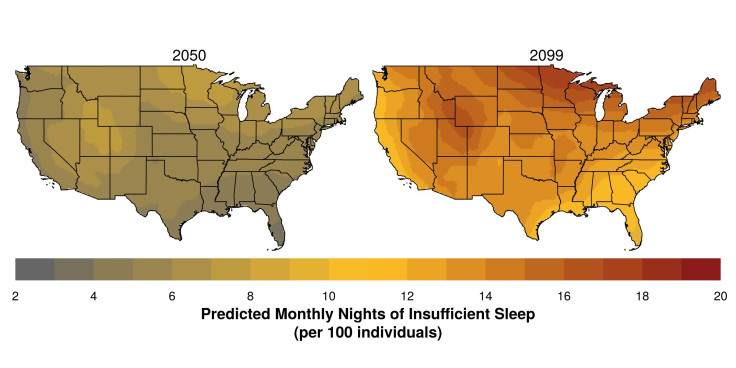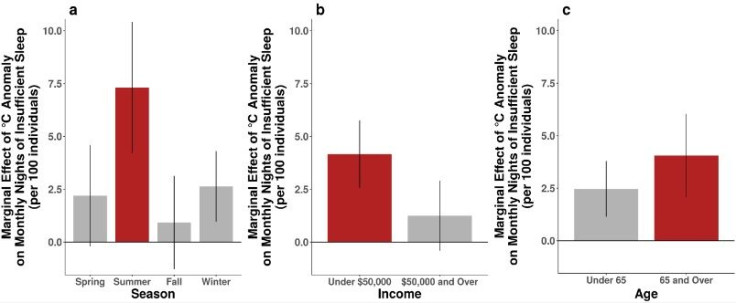Climate Change Impact: Warmer Nights Will Lead To Loss Of Sleep

One of the more consistent effects of the ongoing human-induced climate change is the steady increase in Earth’s temperatures which is rising at an almost unprecedented rate. And while that is a cause for concern for many reasons, some of which are still in the future, it could already be having an effect by causing loss of sleep — in the most literal sense — to a large number of people around the world, including in the United States.
A study published Friday in the journal Science Advances predicts if the climate change scenario continues in a business-as-usual manner, temperatures in 2050 could lead to millions of nights of sleep deprivation every year in the U.S. alone. That number is projected to increase by several hundred million more sleepless nights by 2099.
Nick Obradovich, a postdoctoral fellow at Harvard’s Kennedy School of Government and a research scientist at the MIT Media Lab, as well as a fellow at the Center for Marine Biodiversity and Conservation at University of California San Diego’s Scripps Institution of Oceanography, led the research. He was inspired to undertake it following a heat wave in San Diego in October 2015, when he was a doctoral student at UCSD.
Read: Sleep Deprivation Hurts Your Social Life, Along With Your Health
The chief finding of the study was this: if temperatures were higher than normal by 1 degree Celsius (1.8 degrees Fahrenheit) every night for an entire month, it would mean nine million nights of insufficient sleep across the country. To try and put that in perspective, it could mean a million people in the U.S. will lose sleep for nine nights every month, or nine million people could have one sleepless night every month, just because of the heat.

The negative impact of warmer nights is more pronounced in the summer, when it is about three times stronger than in any other season. By 2050, that number would rise to 27 million nights of insufficient sleep every month, and by 2099, the study, projects it will go up to 51 million nights monthly. And the western and northern regions of the U.S. will experience the largest changes in sleep patterns, because the night-time temperatures in those parts are projected to rise the most.
“Sleep has been well-established by other researchers as a critical component of human health. Too little sleep can make a person more susceptible to disease and chronic illness, and it can harm psychological well-being and cognitive functioning. What our study shows is not only that ambient temperature can play a role in disrupting sleep but also that climate change might make the situation worse by driving up rates of sleep loss,” Obradovich said in a statement Friday.
To reach their conclusions, the researchers first took data of 765,000 U.S. residents from the Behavioral Risk Factor Surveillance Survey, carried out by the Centers for Disease Control and Prevention. The self-reported data about the number of nights with insufficient sleep from the survey was linked with temperature records taken from the National Centers for Environmental Information. The resulting trend was projected for the future using climate model projections.

Correlating the data with different demographic groups, the study also found the effect to be twice as severe for older people, aged 65 years or above, compared to young adults. And even more drastically, the effect is three times worse for people who earn less than $50,000 annually, compared to those financially better off.
“The U.S. is relatively temperate and, in global terms, quite prosperous. We don’t have sleep data from around the world, but assuming the pattern is similar, one can imagine that in places that are warmer or poorer or both, what we’d find could be even worse,” Obradovich said.
© Copyright IBTimes 2024. All rights reserved.





















